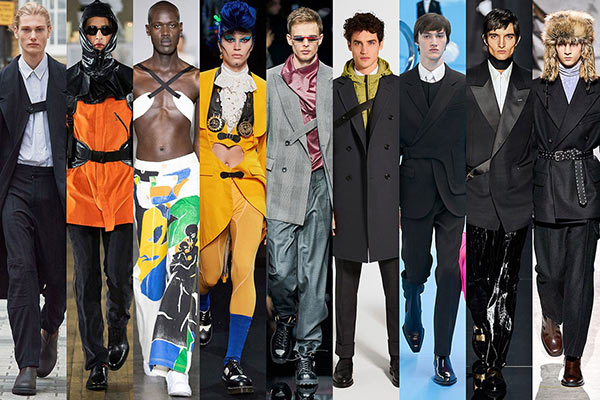Covid, couture & seasonal fashion trends: We speak to Leon Haasbroek

Fashion publicist Leon Haasbroek
While many of us have been spending our days dressed in sweatpants and slippers, only opting to properly dress the top half of our bodies on the off chance we have to switch on our webcams during Zoom meetings, fashion is certainly not dead.
As we move into spring, MambaOnline spoke to fashion publicist Leon Haasbroek to pick his brain about the world of couture in the face of the pandemic, and how the move to online marketing is likely to influence this space.
Leon is the owner of LJHPR, a specialist boutique PR and communications agency, focusing on strategic linking and media relations with the fashion industry in Africa, and has more than a decade’s worth of experience in the local fashion and communications scene.
If you’re wondering what’s hot this spring and have been burning to update your wardrobe, read on.
1. The Great Recession of 2008 resulted in more minimalistic collections from designers across the globe. In the face of Covid-19, what do you predict will happen in the next collections by top local designers?
We have already seen a shift to smaller, more sustainable collections from global labels like Gucci. Labels Versace and Giorgio Armani “put off” their cruise (resort) collections at the beginning of the year. I think local designers were forced to evolve under lockdown restrictions to survive – I know of a couple of boutiques that closed down just after lockdown was implemented.
Over the past couple of weeks, I have seen a huge move from brick-and-mortar stores to the Ecommerce space. Just in the past week, I have moved three designers from a store to online. I think this is going to be the next big thing here in SA. Local fashion leaders have also understood that consumer spend is down due to the huge hike in unemployment, and those of us lucky enough to have retained our jobs are either tightening our spending, or just don’t have the disposable income we had in 2019. This will definitely influence the collections designers will put on the runway, going forward.
The eventing industry is one of the hardest hit in SA, and without events to dress up to, where are consumers going to wear the incredible garments our local talent is producing? This will ultimately force “special occasion designers” to create more ready-to-wear collections.
2. Sustainability in the fashion industry has been a huge topic of discussion over the past few months and years. Do you think the pandemic will have an influence on so-called “fast fashion”, and change the industry for the better in this regard?
Yes, definitely. I think the move to seasonless shows from designers like Gucci will ultimately support slow fashion and sustainability within the industry.
In the past, Gucci would showcase up to seven collections (resort, pre-fall ready-to-wear, pre-fall menswear, fall ready-to-wear, fall menswear, spring ready-to-wear and spring menswear) a year. In an article with the BBC in May 2020, Gucci’s Alessandro Michele announced that he would only be showcasing two seasonless collections a year.
I think this support for slow fashion is the next big thing. As the industry begins to understand the decades of damage it has caused to the environment (through fast fashion and its consumer support), I think we will see more designers making way for sustainable clothing that lasts longer.
3. The move to remote work in an effort to curb the spread of the coronavirus has led to conversations about how officewear might change once we are able to work from the office again. Do you think we’ll see fundamental changes to the ways people dress to go to work once they do return to the office full-time (if they do)?
Look, with the millennial generation making up 41% of the global population, the trends in workwear have already changed. By 2025, millennials will comprise three-quarters of the global workforce. I think this will change the way people dress to work more than the current pandemic will. We have already seen the female workforce purchase garments they can wear to work, but which they can edit with a new shoe and a blazer, and can wear out to dinner with friends right after work. I think this trend will evolve more.

The utility trend looks like it will make waves in the fashion scene this year.
4. Covid-19 has certainly accelerated the move to the fourth industrial revolution, and you also work extensively with influencers in the online realm. What are your thoughts about the ways in which online marketing might change in the future?
The first area of marketing that will experience a big shift will be the traditional print marketing mediums (out-of-home, flyers, magazines, and so on), which will eventually move to the online space (if they have not yet). I think terrestrial TV (SABC and eTV) will still remain the primary medium here is South Africa for some time, but digital marketing will eventually become the primary medium of advertising.
In an era where digital marketing is becoming key, and with all the shouting that brands are doing online about their products, I think influencer marketing (if done correctly) could separate a brand’s messaging from all the online noise.
Influencer marketing is similar to the old word-of-mouth, tried-and-tested form of marketing. Yes, there are naysayers who claim that influencer marketing won’t last very long, or who state that influencer marketing is coming to its end, but the reality is that marketers are becoming more vigilant when selecting influencers for their campaigns.
The key to an incredibly successful influencer campaign is not quantity of following, but rather the quality of the content, and what the influencer’s engagement percentage shows. If you’re a brand concerned about following, rather than engagement, there is a huge problem. You cannot rely on following, but you can gauge the success of the campaign by the engagement of the influencer’s platform. And, of course, followers prefer consuming good quality content. They do not have the time to digest Micky Mouse content.
5. In as well the world of fashion as in the online marketing sphere, supply and demand is key. How do you think the economic fallout of the coronavirus will change the way fashion brands market their products?
I was in a meeting just last week with an agent, and what she said was so incredibly profound – that South African designers chase big quantity purchases or orders from retailers, where if you look at the international export market, boutiques in Japan and the US prefer once-off items that aren’t really available anywhere else.
Creating smaller more impactful collections is the way to go. Once these collections have been created, the designers need to find a celebrity/influencer who speaks to their brand’s ethos, and collaborate with this person. Yes, it has already been done and there is nothing new here, but the manner in which these collaborations have been dealt with in the past is old news: the celebrity/influencer needs to speak about a brand without saying a word. When you see them in the garment, that should say everything about the brand already.
I disagree that Fashion Week is no longer a major event for promoting your new collection – even if there is a faction of designers that believe Fashion Week is old, it’s not. Fashion Week (even during Covid-19) is the only B2B platform where you can promote your collections to a wider, more curated audience. If you’re a designer, you should be showcasing at Fashion Week, end of story.
Another form of marketing that I see sliding into my timelines is short fashion films. A label doing incredible stuff here in South Africa is Throwaway Twenty. Their short fashion films showcase the collection on living humans, and create a lifestyle. I think more local fashion labels should focus on short fashion films.
6. With all of these topics in mind, what are the trends to follow if you want to be in vogue this spring and summer?
I heard a buyer say the other day that the worst thing designers should be focusing on is the word “trends”. I do disagree, but I think what our local market does, is they look at international trends and create works around those for the local consumer. The reality is that the local consumer is not thinking as “out of the box” when it comes to clothing spend.
South Africa is a little more conservative (save for the about 2% of us that really go all out dressing), and one really just needs to go sit in Braam on a Saturday afternoon, or walk around in Sandton City and see what people are wearing to understand what trends you should be following.
Though our consumer is a little more conservative, they know what they want to wear, and at the end of the day, this business comes down to one thing – sales. Internationally, we are currently in fall season. Cropped blazers seem to be the next in-thing. Baby doll and doll dresses seem to be making their way back onto the runways internationally, so we may see these trends come back to South Africa in the first quarter of 2021. Bra tops are also huge at the moment, as female consumers become a little more body confident – I love this look, there is nothing sexier than a dame rocking a bra top under a cute jacket. Sheer tops and overlays are another big one.
For the gents, denim is a no-brainer. I see a lot of strappy tailoring. All-out red seems to be the thing for gents, however I prefer more of an all-out black look. I believe face prints are going to influence male fashion spend, which is super refreshing, as in the past, only the ladies played in this area.
I loathe flannel, so when I say checks are back, I do not mean flannel. Then, in my opinion, the biggest trend across male and female shoppers globally is the utility trend. If you just look at the Chinese street fashion trend on TikTok, you can see that utility is taking over street fashion.
Leave a Reply